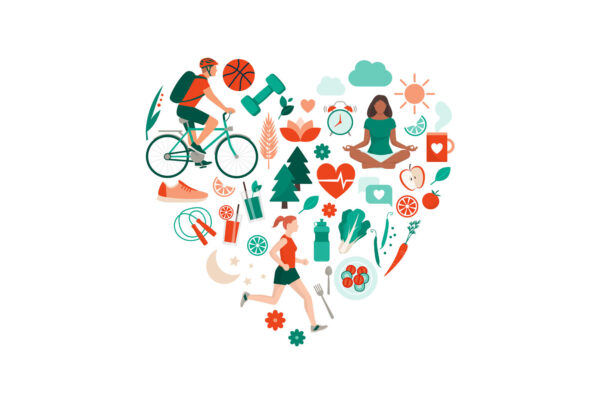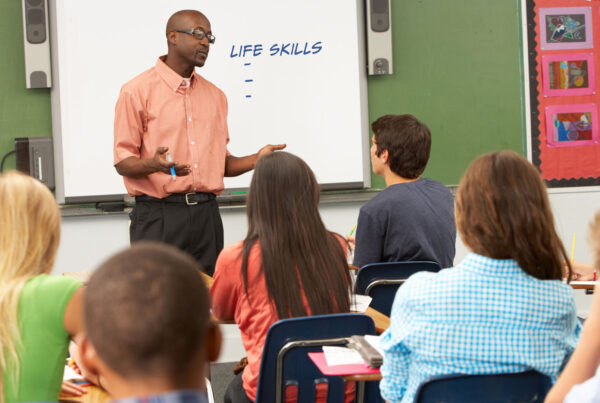Few things are more correct than the old saying that “Teaching is a work of heart.” Teachers spend countless hours focused on meeting the needs of others, wearing many hats; to someone they are the boo-boo mender, and to others a referee and/or superhero. Their schedule is busy and they have few (if any) breaks. Their work day often begins before breakfast and ends with a cell phone reminder telling them that it’s time for bed. They have lists built upon lists of tasks, and they never seem to reach the end. But one thing that most teachers don’t include on their ever- growing list is “me time,” otherwise known as self- care.
Teachers need to make the time and not feel guilty about meeting their own needs. A couple of our teachers at KidsPeace’s education programs in Maine shared some great self-care tips that they use to positively impact their well-being and nurture their souls, minds, hearts, and bodies.
- Shauna Clifford, a special education teacher at our Graham Lake Campus in Ellsworth says that she unwinds after a long day by riding bikes or going for walks with her family. She likes drawing or coloring and working on art projects by herself. She spends time writing in her journal. She also enjoys “vegging” in front of the television while doodling.
- Larry Fickett, a first-year special education teacher at Graham Lake says that he enjoys spending time playing with his son. He enjoys reading for pleasure as well. Larry also runs and weight lifts: “I find that physical activities helps even me out.”
The National Education Association held a webinar called “Wellness Skills for Self-Care and Health for Educational Support Professionals,” presented by Capacitar International—an organization that helps educators deal with traumatic stress. NEA Today spoke with two of the presenters from the webinar and they shared some helpful tips on managing stress.
- Capacitar board member Sheila Grady recognized after visiting several schools that had “calm corners”* that diaphragmatic breathing (also called belly breathing) can help reduce stress. “Make sure you are breathing correctly: On the INHALE, your belly should go out; on the EXHALE, your belly should collapse and pull in,” she says. “The EXHALE breath activates the parasympathetic system and brings calm rapidly. If you hold the EXHALE, breathing a few seconds longer than the INHALE, the emotional part of your brain will calm and allow your cognitive brain to function and focus.”
- International trainer Joan Condon explained that finger holds** can help manage our emotions. It is similar to what we experience when holding a hand, providing comfort to ourselves or others. “Think of each finger as a path to an emotion,” Condon says. According to the article, when one faces difficult or challenging situations – crying, grief, emotional pain, feeling upset, fear, anger, rage, resentment, worry, anxious, self-doubt or not feeling good about ourselves – finger holds may help bring peace, focus, calm and a productive response.
The National Alliance on Mental Illness (NAMI) has identified six elements to effective self- care: Physical, Psychological, Emotional, Spiritual, Social and Professional. Following are a few self- care tips for teachers.
- Exercise. Not only is it a part of a healthy lifestyle, but getting your heart pumping and oxygen flowing can help relieve stress.
- Keep a journal. Write down your feelings and purge your stress, highlight successes no matter how small, or draw a picture. Be creative. According to forbes.com, creativity reduces anxiety, depression, and stress and improves brain function, mental health, and physical health.
- Read. Get lost in the pages of a good book and “tune-out” the world. Be transported to another realm or time. Become one of the characters in the book and experience their emotion. Or maybe learn something new and interesting.
- Meditate. A simple, yet effective way to soothe our minds and soul. It allows us to clear our minds and change our perspectives. It provides a time of peaceful introspection and reflection.
- Go Out. Instead of going home and working more or rehashing the day’s events, go out and do something that will refresh your mind or enliven your soul. It doesn’t have to cost money either. Head to the beach, take a walk in the park and birdwatch, grab your camera or cell phone and take pictures of things you enjoy.
- Sing or Listen to Music. Crank the radio and love that old-time rock- n- roll. Sing your heart out. Sing the wrong lyrics. Make up your own lyrics. Belt it out. Or spend time alone listening to your favorite tunes and drift away, letting the lyrics lull you to sleep. Or get up and dance like you’re the only person in the room. As Taylor Swift sang, “Shake it off!”
Don’t feel guilty about carving out some time for yourself; know the importance of a healthy “self- care” and work-life balance to be the best teacher you can be.
———-
Notes:
* A “calm corner” is a safe area in the classroom where the staff or students can go to regain calmness and self- regulate. They are usually a comfortable area filled with comforting items such as pillows, stuffed animals, books, sensory items, or printed/picture reminders of coping skills that can be utilized.
** A “finger hold” is when you hold each finger with the opposite hand while breathing deeply for 2- 5 minutes. While holding the fingers you are recognizing the emotions and feelings that you are experiencing. You gradually breathe out slowly, letting go of the emotions and feelings and imagining them exiting your fingers and falling away.
———-
Rebecca Greenlaw is the Community Outreach Coordinator for KidsPeace Maine. Rebecca was a certified Special Education Teacher for grades K-8 and 7-12 at KidsPeace Graham Lake in Ellsworth. She is a certified Art Teacher and K-8 General Education teacher, as well. An accomplished artist and published author, Rebecca enjoys movies, music, reading, arts and crafts, volunteering, and spending time at the ocean and lake.
———-
References:
NEA News: Self-Care Strategies Can Help Frontline Workers Manage Stress
By: Sheila Grady, NEA member, and Cindy Long, staff writer
Published: 01/2021
EDUCATION: Why Teacher Self-Care Matters and How to Practice Self-Care in Your School
May 17, 2021
https://www.waterford.org/education/teacher-self-care-activities/
Here’s How Creativity Actually Improves Your Health
Ashley Stahl- contributor
Song: “Shake It Off” written by Taylor Swift, released August 19, 2014 on the album “1989”






